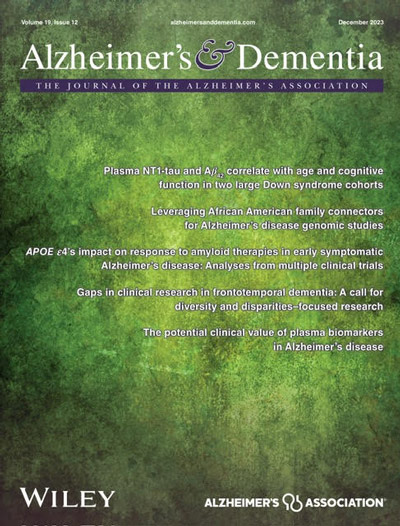摘要
引言 尽管睡眠障碍被广泛认为是认知能力下降和阿尔茨海默病(AD)的风险因素,但其对AD生物标志物的影响仍不明确。本研究旨在阐明睡眠质量或睡眠持续时间是否会影响非痴呆人群血浆、脑脊液(CSF)和正电子发射断层扫描(PET)中的淀粉样β(Aβ)和tau水平。 方法 对截至 2025 年 2 月的 PubMed、Web of Science 和 Embase 进行了系统检索。 结果 共纳入 30 项研究,包括 14,997 名受试者。与睡眠质量好的人相比,睡眠质量差的人 PET Aβ 负担更大,血浆中 Aβ42 水平更高。较短的睡眠时间与较高的 PET Aβ 负荷有关。然而,睡眠质量或睡眠时间与 tau 水平之间均无关联。 讨论 睡眠可通过调节Aβ水平成为早期AD管理的可调节标志物。 亮点 在非痴呆人群中,睡眠质量差和睡眠时间短与正电子发射断层扫描(PET)检测到的淀粉样β(Aβ)负荷较高明显相关。l 针对睡眠的干预措施可作为阿尔茨海默病早期管理的一种可行且低成本的预防策略。

INTRODUCTION
Although sleep disturbances are widely recognized as risk factors for cognitive decline and Alzheimer's disease (AD), their influence on AD biomarkers remains unclear. This study aimed to clarify whether sleep quality or sleep duration affect amyloid beta (Aβ) and tau levels in plasma, cerebrospinal fluid (CSF), and positron emission tomography (PET) in non-demented populations.
METHODS
PubMed, Web of Science, and Embase were systematically searched up to February 2025.
RESULTS
In total, 30 studies were included comprising 14,997 subjects. Individuals with poor sleep quality exhibited greater PET Aβ burden and higher Aβ42 levels in plasma than those with good sleep quality. Shorter sleep duration was associated with higher Aβ burden on PET. However, no association between either sleep quality or sleep duration and tau levels was found.
DISCUSSION
Sleep may be a modifiable marker of early AD management by modulating Aβ levels.
Highlights
- lPoor sleep quality and shorter sleep duration were significantly associated with higher amyloid beta (Aβ) burden detected by positron emission tomography (PET) in non-demented populations. Poor sleep quality was also associated with elevated Aβ42 levels in plasma.
- lNo significant associations were found between sleep quality or sleep duration and tau levels in plasma, cerebrospinal fluid, or PET.
- lInterventions targeting sleep could serve as a viable and low-cost prevention strategy for early management of Alzheimer's disease.

 求助内容:
求助内容: 应助结果提醒方式:
应助结果提醒方式:


